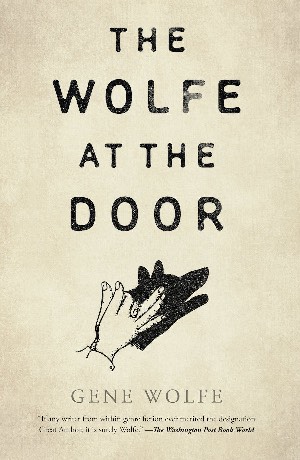
The Wolfe at the Door
There comes a time in a reviewer’s life to rectify some wrongs. Gaps in one’s readings and viewings abound and should be addressed. One of my gaps concerns the writings of Gene Wolfe (1921-2019.) I was aware of the author’s respect within the community. Renowned speculative fiction author Ursula K. Le Guin famously pronounced, “Wolfe is our Melville.” He has also been compared to other icons of literature and the arts. Therefore, when the opportunity arose to score the recent Tor publication The Wolfe at the Door I jumped at the chance. The bulk of the stories can be classified as fantasy and/or speculative fiction; Wolfe was best known for his work placed in those categories. But Wolfe’s writing defies classification, and the author’s contributions should be regarded as genre fluid. A handful of the tales in the collection would probably rest under the umbrella of horror. I’ve selected some samples to discuss that do possess properties of the genre. They should, however, be read with a parenthetical instructional caveat: Wolfe tended not to color within the lines.

“The Grave Secret” is less than four pages long and is a fine example of brevity achieving maximum impact. The narrative is about a necromancer: “A necromancer with a long series of failures and near successes who at last thought that he had mastered the craft. He had bought ancient manuscripts of papyrus, vellum, and leather (sometimes leather whose texture suggested a decidedly sinister source) and by means of chemistry and ultra-violet light had pushed aside the writing of hands long dead to disclose writing older still, and not always human.” This quick but immersive delving into the character’s occult history establishes the protagonist’s persona. And with a precise description of paraphernalia of the trade, Wolfe provides an eerie glimpse into the accoutrements of the arcane: “He extracted a package from his coat pocket and produced a flask containing a fine gray powder whose composition would have shocked the average hyena. With his cigarette lighter he lit thirteen greasy, malformed candles whose tortured twistings seemed to suggest that their very wax shrunk away in horror from the foulness in their wicks.”
In “The Gunner’s Mate” a romantic woman becomes entranced by an island. Without saying too much about plot details, she does embrace the mate in the phrase “Ahoy matey!” This supernatural tale sways in harmony with palm trees and sultry breezes. Throw in an affable parrot, antique coins surfacing on the beach, and a hovering hunky presence who is seen by fellow vacationers but not the captivated woman, and you have one heady holiday. Wolfe succeeds here with atmosphere despite a predictable denouement.
“The Little Stranger” features a recurring element in Gene Wolfe’s fiction, the unreliable narrator. Research on Wolfe indicates that he regarded people in general to be unreliable narrators, since we can seldom relate a memory or event multiple times without somewhat deviating. He was quite skeptical of the so-called unassailable account. In this epistolary yarn, elderly Cousin Ivy sends letters about her everyday life to her cousin Danny. Danny is deceased. Ivy may be delusional. In addition to letters to a dead relative, she muddles temporal events and exhibits an unhealthy affinity for youngsters. There’s a fairy tale vibe imbedded in this ambiguous narrative which heightens the blurring of fantasy and factuality. Reality can be perceived as merely a state of mind, or possibly there’s more to Ivy than the rational world can process.
Wolfe also dabbled in poetry and one of the poems included in The Wolfe at the Door expresses the wonder of the unknown and the possibilities to experience it:
CONNECT THE DOTS Secrets of the universe Spattered on a windowpane, Diamond drops of runic verse Writ and wiped away again. Silver spells compel the spirits’ Patt’ring laughter. Here it? Hear it?
The line “Diamond drops of runic verse” is a beauty and the “Here it?” contrasting yet connecting with “Hear it?” is rhetorically clever.
The Wolfe at the Door gave me the opportunity to read a variety of Wolfe’s work. In addition to tales more suited to the theme of this website, I also very much enjoyed two stories about robots, “Unrequited Love” and “It’s Very Clean” which show the heartbreak of human and robot dynamics. There is another yarn concerning a sentient refrigerator that is more comedic and highly worthwhile. Of the fantasy selections, “The Magic Animal” is a must-read take on Arthurian legend from the perspective of a modern adolescent girl. A standout peripheral character is a raven who talks like a detective novel gumshoe. The story is warm and wise. And yes, magical.
It was grand to finally catch up on some of the writings of an esteemed author whose work I had previously neglected. It’s more than a rectification. It’s an enrichment.

